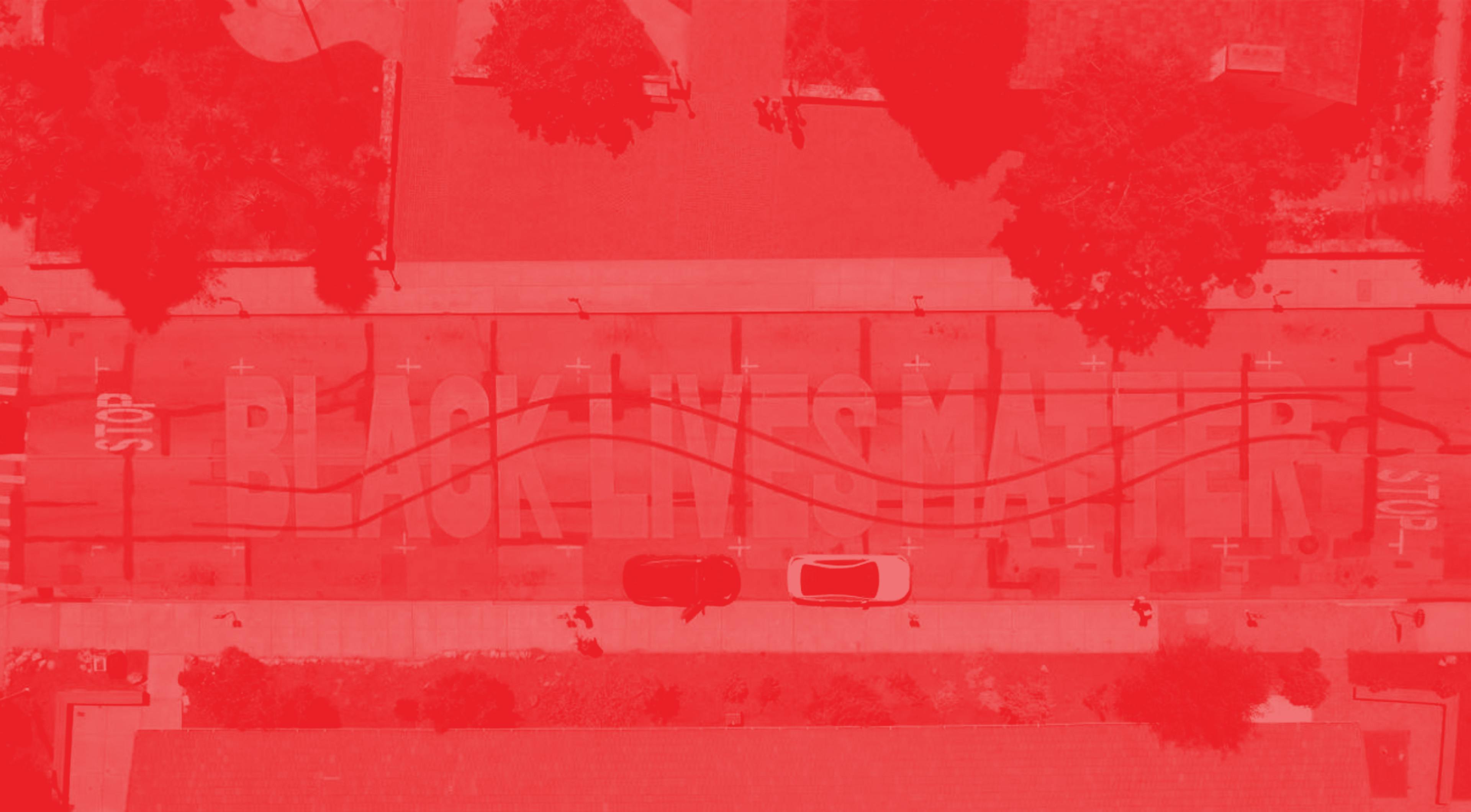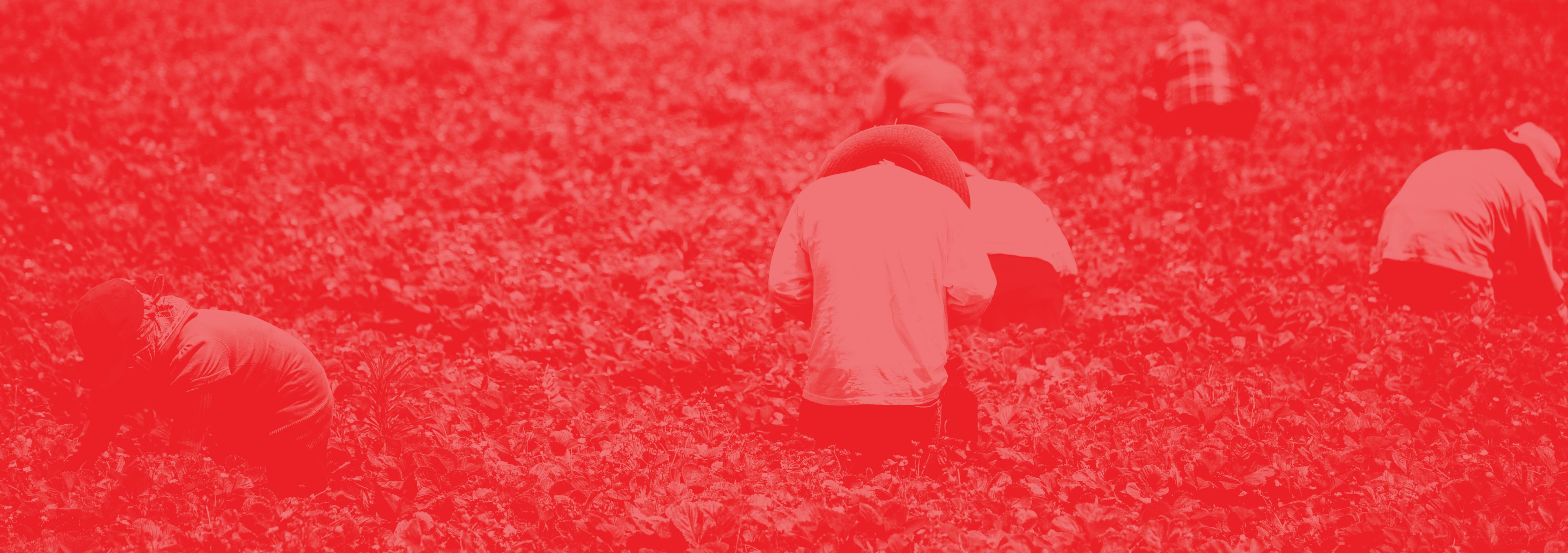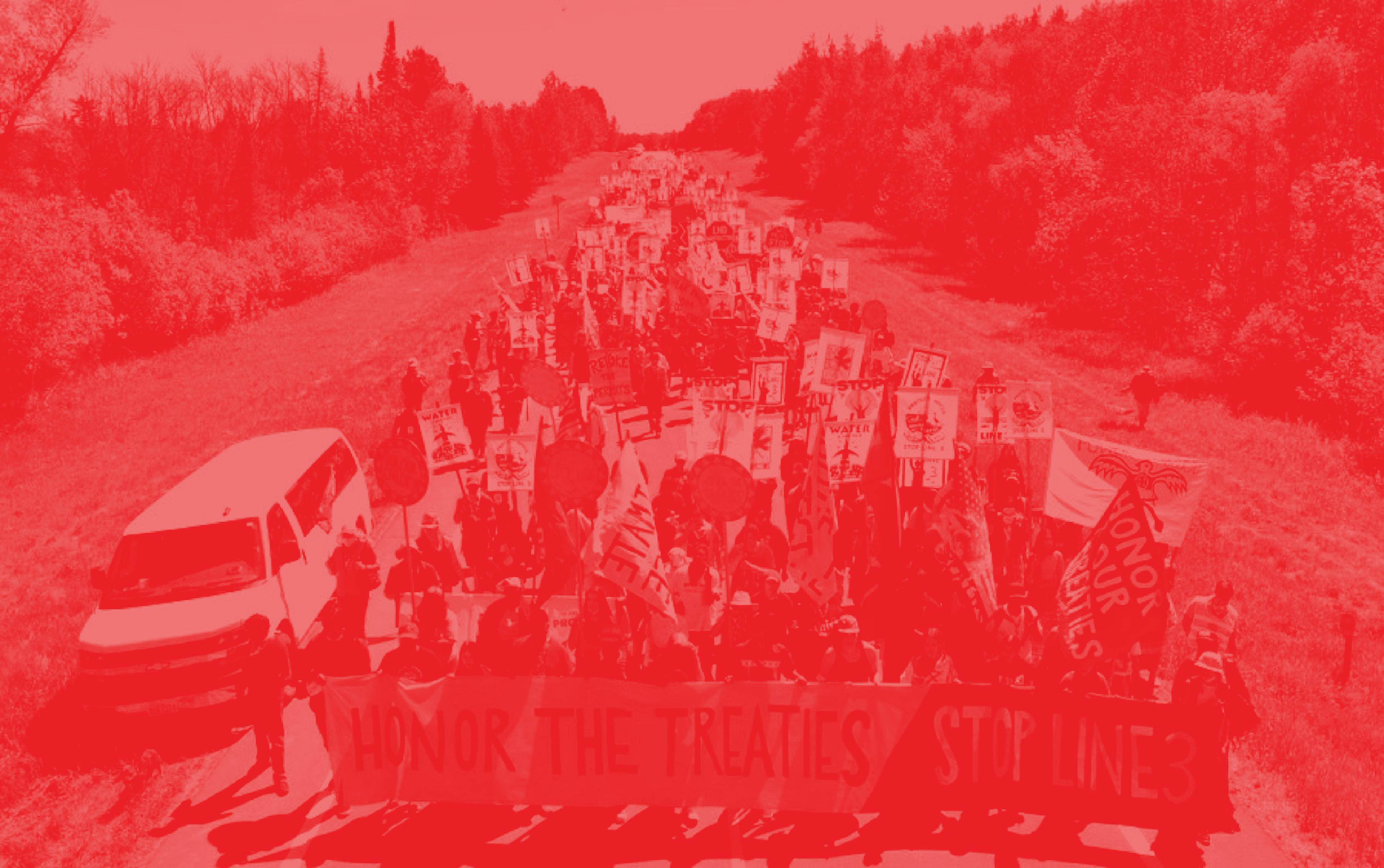
Standing against Line 3
Laurie Palmer: What do you most want others to know about what is happening there?
Will Parrish: This ongoing ground campaign against Line 3 is currently the biggest mobilization in the country against a fossil fuel infrastructure project – probably the largest since the Standing Rock struggle against the Dakota Access Pipeline in 2016-17. The outcome of this campaign against Line 3 could resonate for years, shaping Indigenous self-determination struggles, environmental protection, and the climate fight. Enbridge is pushing to build as much of the pipeline as quickly as they can, and this summer is when people are being called on to use their bodies, hearts, and minds to stop that construction. Northern Minnesota is the place, and now is the time.
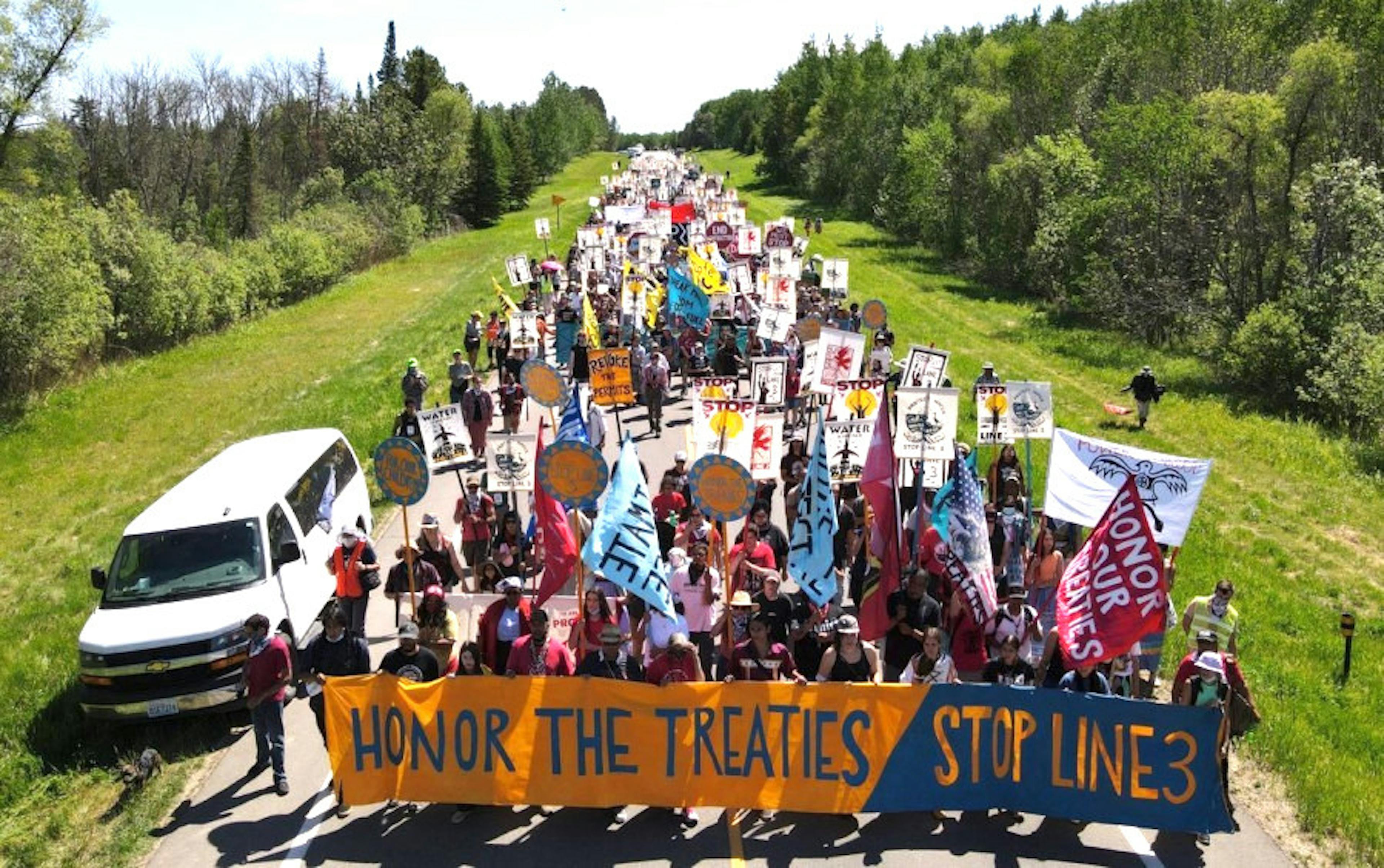
Right now, there are at least four main Indigenous-led camps across the pipeline route where people are staging non-violent direct action aimed at slowing down the pipeline and engaging in collective care for those involved in the struggle. These camps – Red Lake Treaty Camp, Shell River Camp, Camp Namewag, and Camp Migizi – have all put out a call for people to come to northern Minnesota right now and dedicate themselves to this struggle, whether by cooking, making art, performing child care and animal care, doing media work, or physically blocking the pipeline’s construction. I encourage everyone reading this to go look up some of the numerous websites that describe how and where to become involved (such as stopline3.org, Giniw Collective on Facebook and Instagram, Camp Migizi on Instagram, Red Lake Treaty Camp on Facebook, and Unicorn Riot’s coverage ).
This struggle in northern Minnesota against Line 3 is a struggle against the vicious capitalist and colonial relations that bind and sustain the fossil fuel economy that is plundering the planet and fueling the global climate crisis. It is a collective struggle by Indigenous people for sovereignty and self-determination. Anishinaabe people, who are Indigenous to the area the pipeline passes through have been at the center of the fight against this project for years. Stopping a pipeline is an urgent part of their struggle, but this is not just about stopping a pipeline. It’s part of a longer-term process of resisting capitalist, colonialist forces. Anishinaabe folks are seeking to protect the land and waters in their territories and preserve their identities in the face of an ongoing assault by the violent white supremacist empire that is the United States. For example, wild rice, or manoomin in Ojibwe, is central to the spiritual and physical sustenance of Indigenous people in the area – and it is disappearing (owing to climate change, water pollution from mining and other sources, and the genetic modification of rice within agribusiness labs). The pipeline would bore under more than 200 lakes and other water bodies in the Northern Lakes Region. In the process, it threatens to devastate much of the remaining wild rice habitat in the area through spills, leaks, and water extraction during the construction process. This is something that people whose lives are intimately bound up with the rice simply cannot allow to happen.
This fight against Line 3 is fundamentally an anti-capitalist, anti-colonial struggle where people are fighting back and taking control of their destinies.
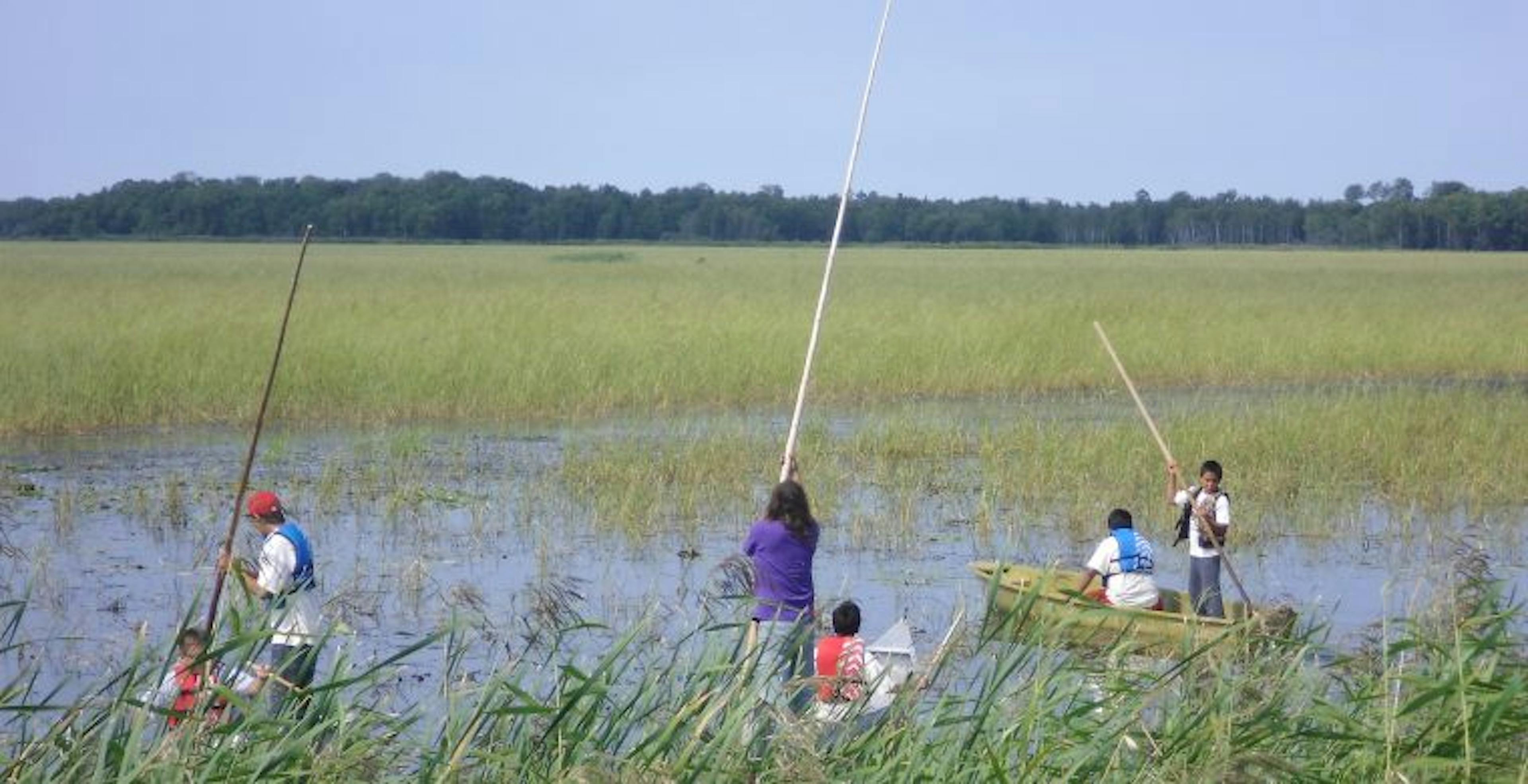
Youth from the Leech Lake Band of Ojibwe tend wild rice in Minnesota (Photo: U.S. Department of Agriculture)
So, the struggle against Line 3 invites us to imagine a different future where Indigenous people are not dominated and cast aside by a colonial system, but rather exercise self-determination; a future where struggles by the people win out against the forces of capital and the state; a future where the health of the land and water and air we rely on are improving rather than rapidly deteriorating. Stopping this pipeline concretely moves us toward all of those things. It takes new and creative forms of resistance to create that future – and that’s a project that everyone is invited to be a part of, in varying ways.
LP: Following what you said about the act of creating a different form of resistance, could you characterize what it’s like to be part of a movement that’s Indigenous organized and led, and if you have experiences to compare it to in other protest movements that you’ve been engaged with and that were differently organized?
WP: Like I mentioned, the pipeline is threatening the sources of cultural and spiritual sustenance that in many ways define the Indigenous people of the area, that are the basis for who they are. In contrast to many mostly white-led conservation movements, which often seek to diminish human contact with land, Indigenous-led struggles – much like other reproduction struggles throughout the world – are about preserving people’s historical role as caretakers and active participants in shaping their environments. Indigenous people are protecting the wild rice beds that they rely on for food, for sustaining their spirituality, and for their livelihood (because wild rice harvesting is part of how a significant number of people here make money). The quality of the relationship that many people have with the land and water is such that they are truly willing to do whatever they possibly can to protect it. So, the relationship to land is different than most conservation movements.
LP: Could you describe how a typical day of being in a camp unfolds?
WP: Where I am there are many tasks that are involved in maintaining the camp on a day-to-day basis. Everyone follows a similar rhythm, which involves everything from having meetings to cooking, cleaning, providing security, and monitoring the progress of construction. There are workshops that everyone attends on various subjects. Some people go out and do actions like locking themselves down to equipment in order to stop the operation. On a daily basis, the majority of people are engaged in the work of maintaining the camp space. Above all, the camps serve as organizing sites from which people launch opposition to the project and form tight bonds with one another.
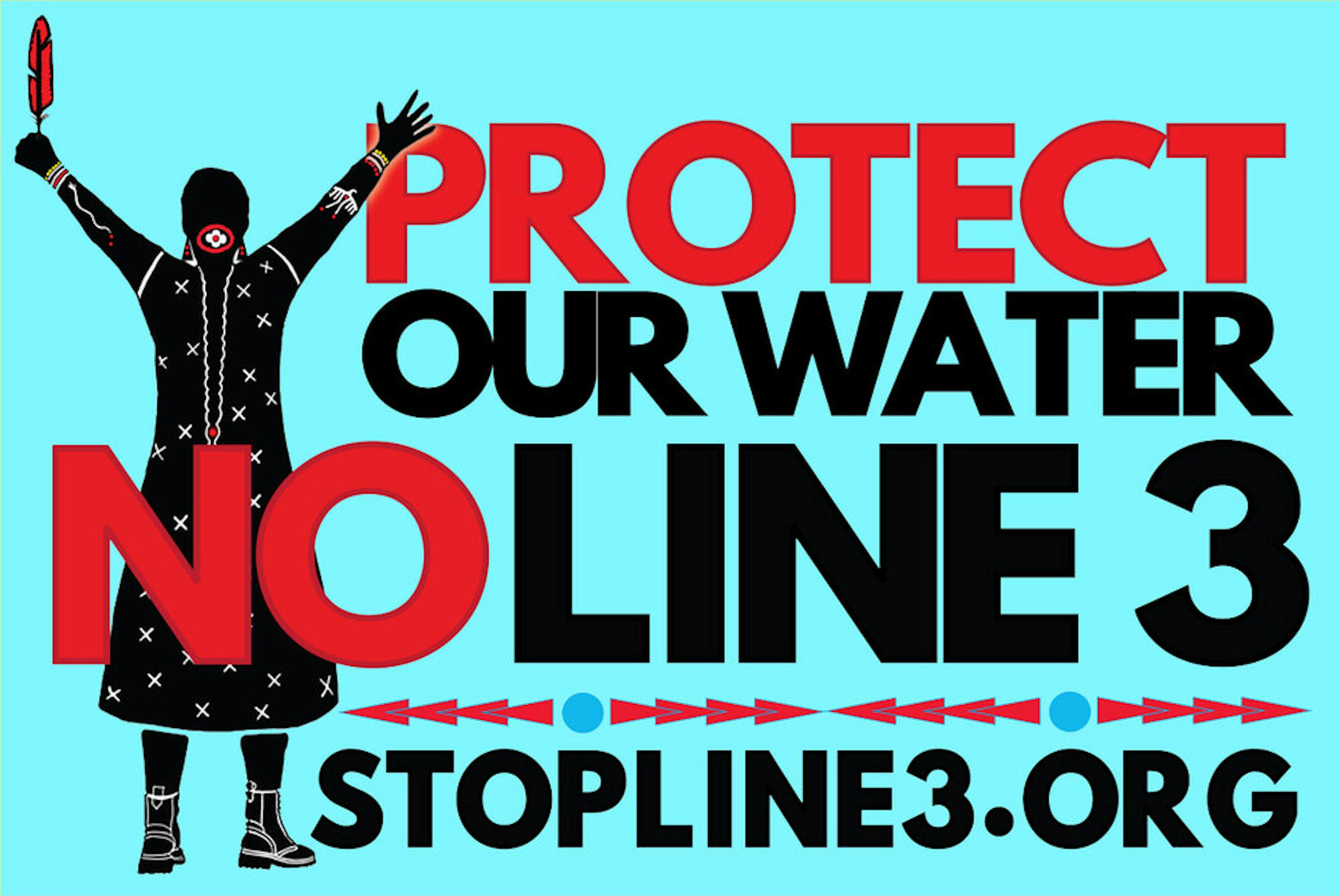
LP: How did you get to Line 3?
WP: There are a couple of different levels that I will speak to in answering that. I have been connected to struggles against fossil fuel pipelines for several years, starting with the movement against the Dakota Access Pipeline. I traveled to Standing Rock. I also engaged in solidarity organizing in support of the #NoDAPL struggle where I was living at the time, which in turn grew out of my involvement in prior and existing Indigenous self-determination and environmental protection struggles. Subsequent to being at Standing Rock as a participant—at the time I was also working as a journalist—I ended up writing about the #NoDAPL struggle with an initial focus on highlighting the legal persecution that people were facing for participating in actions there. I did a lot of FOIA (Freedom of Information Act) request work to figure out what was going on behind the scenes with the collaboration between police and private security working on the pipeline, for example. That set me on the path of doing a lot of research and writing about these efforts to stop fossil fuel pipelines and other infrastructure construction elsewhere, especially in the U.S. and Canada. That engagement is part of what inspired me to go back to graduate school and pursue a PhD, since I felt compelled to draw on various philosophical and theoretical bodies of knowledge as a means of deepening our shared understanding of the significance of movements like this, particularly in a moment of profound ecological crisis. So, my involvement grows out of experiences as a participant, as a writer, and as an academic who engages with radical movements and spaces.
I have been tracking Line 3 for the past few years, but partly because of the demands of graduate school and the Covid-19 pandemic, I came out here only recently. I was inspired by how much they are mobilizing this summer. I contacted people I knew and figured out how to make my way here, where to go, and how to play a small part in things that are happening. This is my second trip so far and I will be here for at least a couple of weeks.
In responding to your question, I also briefly want to touch on how this struggle relates to the climate crisis, which is certainly one part of the motivation for me and countless others in coming out here. The impacts of the pipeline, if completed, on the climate will be immense. It would bring a massive amount of tar sands bitumen, strip-mined from the boreal forest region of Alberta, into the United States to be turned into petroleum products. It would be a major expansion of tar sands fossil fuel infrastructure. Besides destroying the homelands of Cree and Dene First Nations in the Athabasca region, tar sands are by some measures the most carbon-intensive fuel source in the world, resulting from the processes of extracting, chemically processing, refining, and burning it, and then emitting greenhouse gases into the atmosphere. In fact, the pipeline would add 50 new coal plants’ or 38 million additional cars worth of greenhouse gas emissions to the atmosphere every year for the next three to five decades. So, on one level, stopping this particular pipeline is crucial because Line 3 would lock in significantly more carbon emissions at a time when we are seeing and feeling the devastating consequences of the climate crisis every single day.
Line 3 also ties the struggle against climate change to capitalism’s systemic contradictions. The construction of the pipeline is juxtaposed with the subjugation of Indigenous people, leading to a wider critique. Capitalism can draw oil from the ground only because of a system of land ownership that is based, to a significant extent, on settler-colonial domination of Indigenous people. By the same token, struggles of the poor, colonized, the working class, and the dispossessed must grow and thrive if we are to undermine and ultimately overturn the systems of domination that fuel the climate crisis. This fight against Line 3 is fundamentally an anti-capitalist, anti-colonial struggle where people are fighting back and taking control of their destinies, and I’m here to support that.
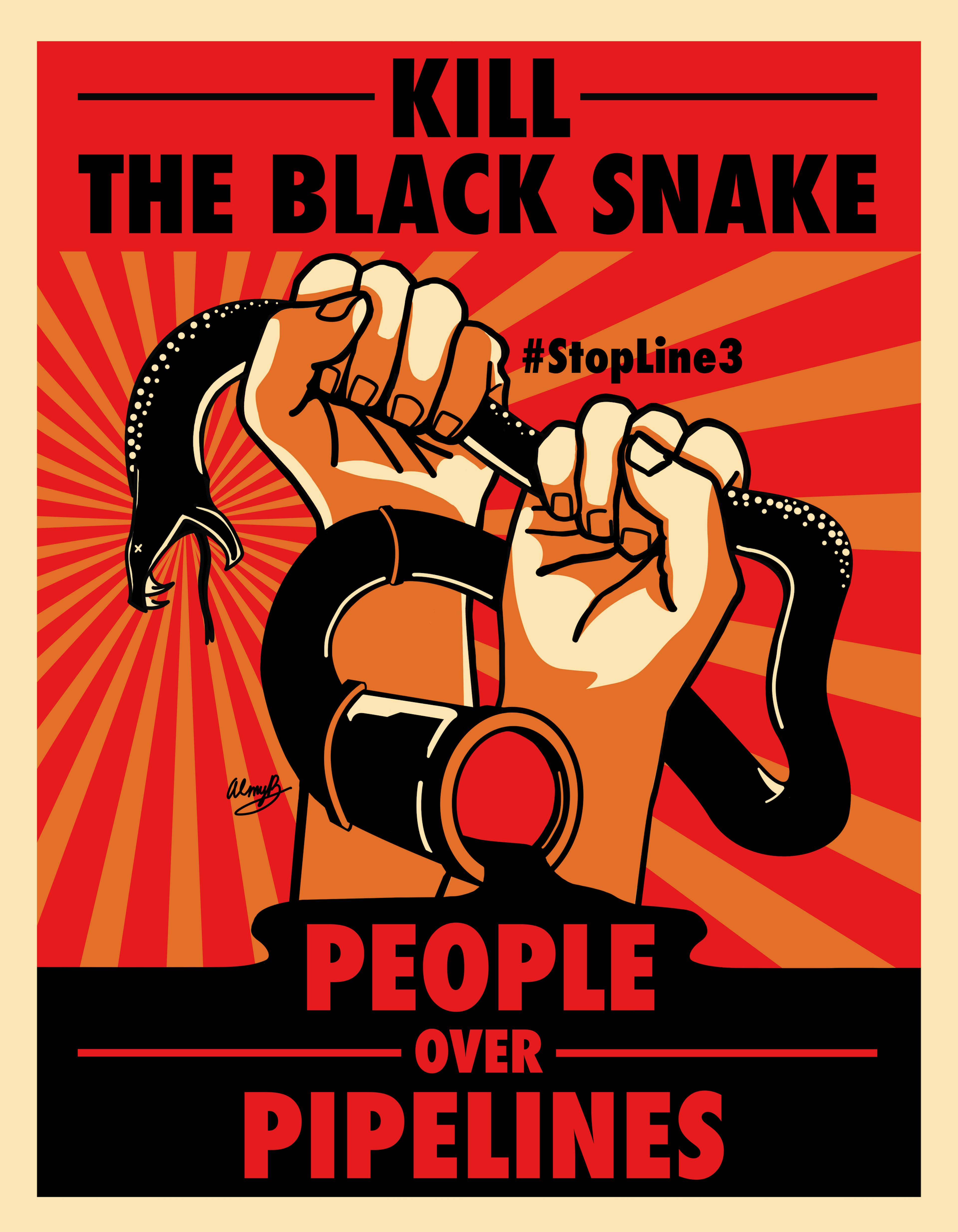
LP: The June 7th protest turned out a lot of people and there were many arrests. Has there been an ebb and flow of support since then? Where are things at now?
WP: The Treaty People Gathering in early June was a major mobilization and the high point in terms of sheer numbers of people being here. People did a lot of important work during that gathering and helped put the struggle on the map in a new way. With more attention on Line 3, there have been more people here than previously, although not as many now as in early June. But there is still a sustained effort to slow down the pipeline construction. Although a lot of the actions have not received as much of the limelight as the Treaty People Gathering, there have been consistent actions happening where people try to blockade the pipeline or lock down to equipment, slow down construction, or stop work at particular key sites for a day or sometimes longer. Sometimes these actions interfere with the schedule of construction. Because specialized equipment and processes have to be used to drill under lakes and rivers, temporarily shutting down activity might actually set back the construction timeline at that site by a couple of weeks.
At this point, about 600 people have been arrested doing direct action—by comparison, at Standing Rock there were about 700-plus arrests. Standing Rock may have been bigger in terms of participants, but Line 3 has met with consistent resistance. We know that these sorts of actions truly only work if enough people show up and take part. At this point, it’s hard to say what will result. Construction of the pipeline is proceeding quickly, but it’s still possible to stop it – and the only thing slowing it down currently is when people physically get in the way.
LP: The consistency and perseverance are really inspiring to hear about. Do you or other people there see any potential for a positive response from the Biden administration or from the Canadian government?
WP: There are different takes on that. My personal feeling is that nothing is going to come from the Trudeau government in Canada. It’s possible that something could come from the Biden administration but it’s only going to intervene if there’s significant pressure. They’ve already telegraphed that they aren’t eager to jump into this. The Justice Department is currently defending the Army Corps of Engineers’ permits for this project in courts. The Line 3 struggle is going to have to create a greater political crisis for the Biden administration to respond. Perhaps the upcoming climate summit in Glasgow, Scotland and the unfolding crisis of extreme weather events across the US and globally could be part of a shifting of political calculations in Washington. Again, construction is proceeding quickly, but the situation is dynamic enough that we don’t know how how it will unfold.
LP: It’s helpful to hear about how people might help to tip things in certain directions. Can you talk about the ways in which state and private security are collaborating on the police response to the protest?
WP: There has been a pattern in many of these pipeline struggles of what could justifiably be called a fascistic collaboration between private mercenaries, corporate security personnel, and the police. It’s interesting that one of the conditions of the permit Enbridge received for the project was that they wouldn’t engage in counter-insurgency against demonstrators. That condition references what happened at Standing Rock, where private mercenaries with experience as military contractors in Iraq and Afghanistan were tapped by Energy Transfer Partners (who built the Dakota Access Pipeline) to repress and surveil water protectors and collaborate with the police.
At Line 3, there’s a rhetorical move to avoid explicit repression but in actual practice it’s hard to tell where the lines are being drawn, if at all. Investigative reporters have shown that police meet every day with Enbridge. They have an operations center in Duluth, Minnesota, and an Enbridge rep is there with the police everyday working on how to respond to the protest. So there is close collaboration happening between the police and Enbridge to the point where there is not much of a line between them. Enbridge is actually paying for the police work in responding to protests: buying them equipment and paying for their overtime. It shows the extent to which the police are enmeshed with corporations on one side of this conflict. They have done things that are very repressive and heavy-handed. For example, they closed down access to one of the camps even though it’s on private land. They’ve impounded vehicles, arrested people, and ticketed others for driving on the road to get to the protest camp. They’ve cited an ordinance never used before to try to mess with an Indigenous-led camp that’s on private property.
The police are doing a lot of heavy-handed things, but at the same time, there is freedom to do actions and freedom to move around and provide support. I don’t want to paint too gloomy a picture – it can sound really bad if people hear reports of Department of Homeland Security helicopters flying over, which did happen for sure. But while there is pretty intense police repression happening, people are still managing to exercise political agency and do actions.
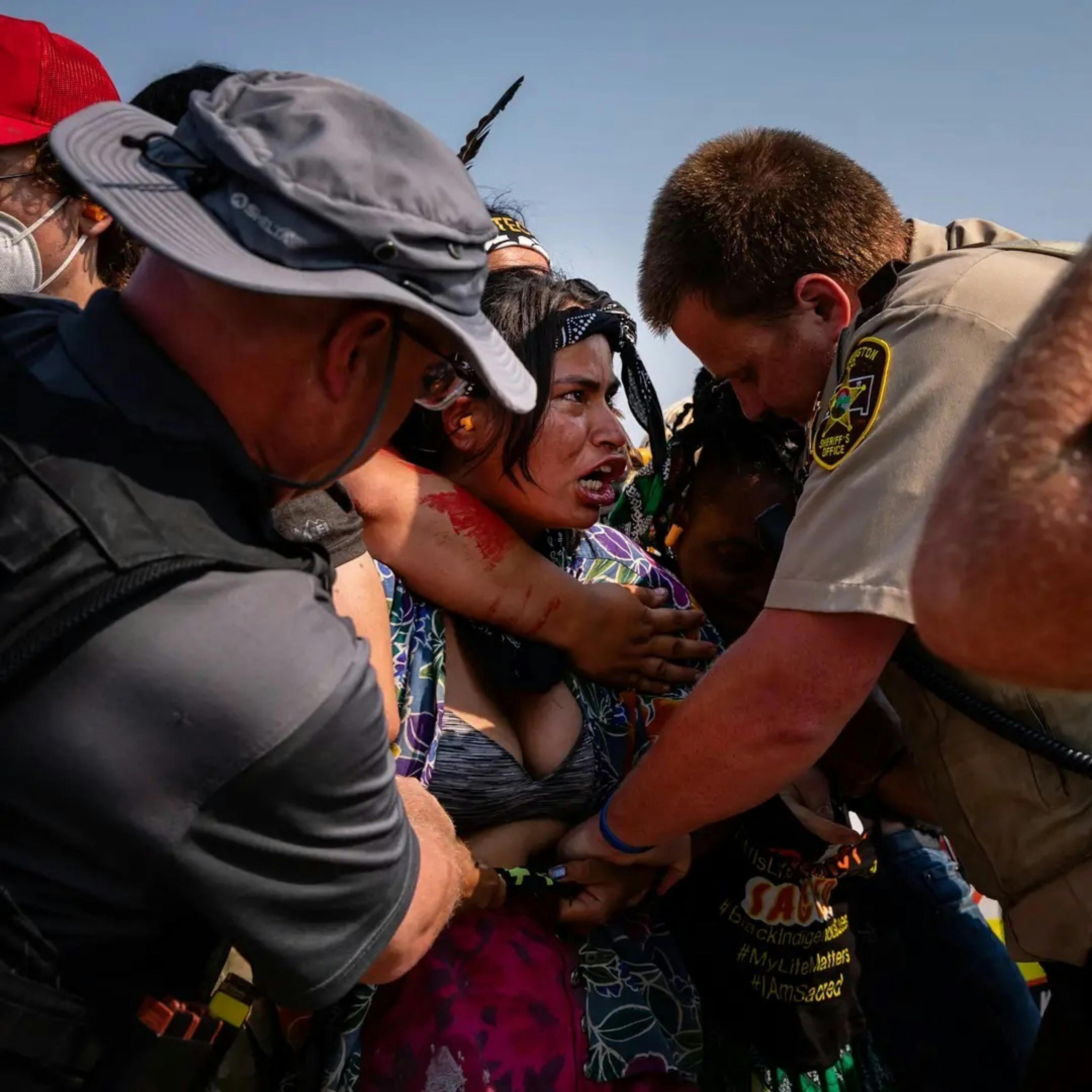
Alex Golden Wolf, Two-spirit Indigenous leader of the White Earth Nation, was violently arrested during a ceremony, #RedLakeTreatyCamp, July 23, 2021.
LP: What kind of charges are people being arrested for?
WP: There has been a recent move to try to impose harsher penalties. Some of the recent charges have been felony theft for locking down to equipment. The state’s legal theory is that people are stealing from Enbridge, in using Enbridge’s equipment to delay the project and cost the corporation money. Several people are facing that charge, which they only started using a couple of weeks ago. We’re also increasingly seeing a politicization of the courts, using them as an instrument of legal repression to dissuade water protector actions and exact retribution when they refuse to comply. I guess we will see how that plays out...
LP: It sounds like the bail fund is a crucial way for people who can’t come to the camps to try to contribute if they can, and that could be either through sending a donation to Honor the Earth, Winona LaDuke’s organization, or directly to the camps, both of which can be found on the Stop Line 3 website. How has DSA played a role and how else can DSA members be more involved? We know DSA chapters in Minnesota have been organizing against Line 3, as reported recently in Democratic Left.
WP: I haven’t personally encountered anyone who has identified themselves as a DSA person at the camps I have been in. My sense is that DSA has played a role in a broader political sense by popularizing ecosocialism and contributing to a growing acceptance of and interest in left politics in the last few years in the U.S. And that certainly has contributed to the interest in and support for struggles against fossil fuel pipelines.
LP: Is there anything you want to add that we haven’t addressed?
WP: One last thing to emphasize is that while it’s important for people who are available to come out to Minnesota to be here on the ground, the real work is to enliven our struggles and our movements everywhere. Line 3 is a front line, to use the language that has become common around struggles fighting the fossil fuel industry and for Indigenous self-determination. But the climate strikes in Santa Cruz a couple years ago also play an important part. It’s urgent for people to support the Line 3 struggle here and now. Truly getting free is going to take all of us doing lots of different work in our own contexts. There is lots of room to do Line 3 solidarity work, including locally. Line 3 is a major struggle that’s come to fruition after years of organizing. As such a visible and important struggle, it can help us all think about and imagine how the organizing we do elsewhere can grow and flower, now and in years to come.
* Laurie Palmer, of DSA Santa Cruz’s Ecosocialist Working Group, interviewed Will Parrish by phone from Santa Cruz on July 25, 2021. ecosocialism@dsasantacruz.org / https://dsasantacruz.org
